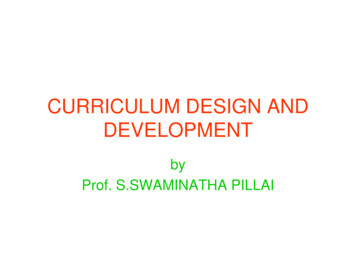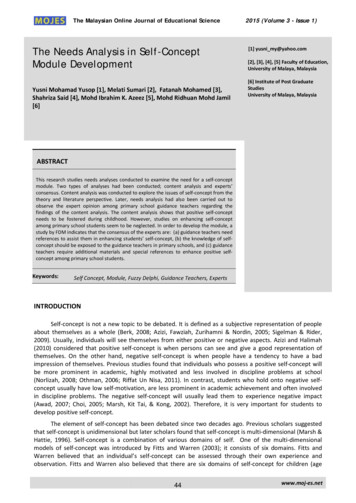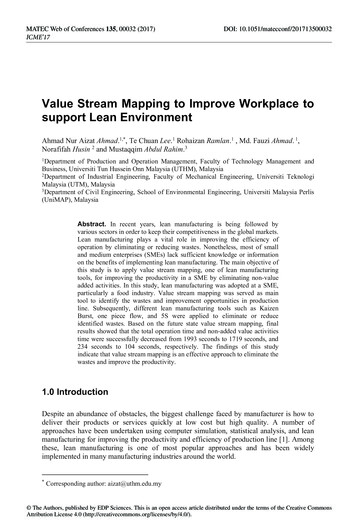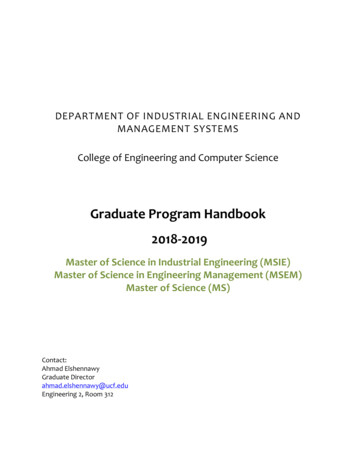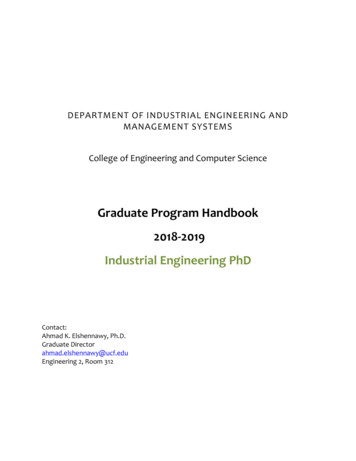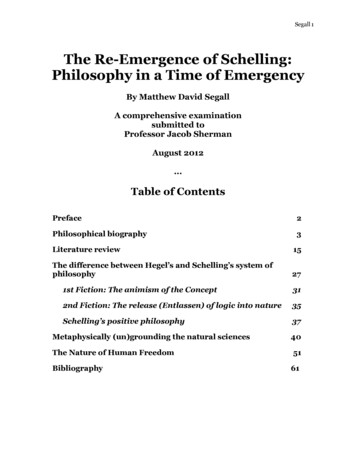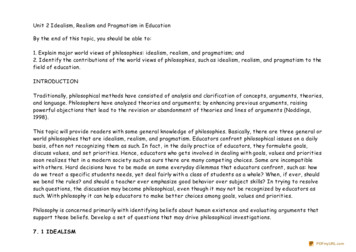
Transcription
Unit 2 Idealism, Realism and Pragmatism in EducationBy the end of this topic, you should be able to:1. Explain major world views of philosophies: idealism, realism, and pragmatism; and2. Identify the contributions of the world views of philosophies, such as idealism, realism, and pragmatism to thefield of education.INTRODUCTIONTraditionally, philosophical methods have consisted of analysis and clarification of concepts, arguments, theories,and language. Philosophers have analyzed theories and arguments; by enhancing previous arguments, raisingpowerful objections that lead to the revision or abandonment of theories and lines of arguments (Noddings,1998).This topic will provide readers with some general knowledge of philosophies. Basically, there are three general orworld philosophies that are idealism, realism, and pragmatism. Educators confront philosophical issues on a dailybasis, often not recognizing them as such. In fact, in the daily practice of educators, they formulate goals,discuss values, and set priorities. Hence, educators who gets involved in dealing with goals, values and prioritiessoon realizes that in a modern society such as ours there are many competing choices. Some are incompatiblewith others. Hard decisions have to be made on some everyday dilemmas that educators confront, such as: howdo we treat a specific students needs, yet deal fairly with a class of students as a whole? When, if ever, shouldwe bend the rules? and should a teacher ever emphasize good behavior over subject skills? In trying to resolvesuch questions, the discussion may become philosophical, even though it may not be recognized by educators assuch. With philosophy it can help educators to make better choices among goals, values and priorities.Philosophy is concerned primarily with identifying beliefs about human existence and evaluating arguments thatsupport those beliefs. Develop a set of questions that may drive philosophical investigations.7. 1 IDEALISMPDFmyURL.com
In the Western culture, idealism is perhaps the oldest systematic philosophy, dating back at least to Plato inancient Greece. From that time until now, idealism has been a dominant philosophical influence to our society, forexample in the American philosophical thought, it was inspired so much by the German idealism. Even thoughidealism is not as strong as it was before, it is still alive in certain areas such as contemporary religious studiesand certain aspects of moral philosophy.Idealism is the philosophical theory that maintains that the ultimate nature of reality is based on mind or ideas.It holds that the so-called external or real world is inseparable from mind, consciousness, or perception.Idealism is any philosophy which argues that the only things knowable are consciousness or the contents ofconsciousness; not anything in the outside world, if such a place actually exists.Indeed, idealism often takes the form of arguing that the only real things are mental entities, not physicalthings and argues that reality is somehow dependent upon the mind rather than independent of it. Some narrowversions of idealism argue that our understanding of reality reflects the workings of our mind, first andforemost, that the properties of objects have no standing independent of minds perceiving them.Besides, the nature and identity of the mind in idealism upon which reality is dependent is one issue that hasdivided idealists of various sorts. Some argue that there is some objective mind outside of nature; some arguethat it is simply the common power of reason or rationality; some argue that it is the collective mental facultiesof society; and some focus simply on the minds of individual human beings.In short, the main tenant of idealism is that ideas and knowledge are the truest reality. Many things in theworld change, but ideas and knowledge are enduring. Idealism was often referred to as idea-ism. Idealistsbelieve that ideas can change lives. The most important part of a person is the mind. It is to be nourished anddeveloped.To achieve a sufficient understanding of idealism, it is necessary to examine the works of selected outstandingphilosophers usually associated with this philosophy. Idealism comes in several flavors:(a) Platonic idealism - there exists a perfect realm of form and ideas and our world merely contains shadows ofPDFmyURL.com
that realm; only ideas can be known or have any reality;(b) Religious idealism - this theory argues that all knowledge originates in perceived phenomena which have beenorganized by categories.(c) Modern idealism - all objects are identical with some idea and the ideal knowledge is itself the system ofideas.How does modern idealism compare with the other idealism of earlier periods? Discuss.7.1.1 Plato nic IdealismPlato was a Greek philosopher during the 4th century B.C.E. - a student of Socrates and teacher of Aristotle.Platonism is an ancient school of philosophy founded by Plato. At the beginning, this school had aphysical existence at a site just outside the walls of Athens called the Academy, as well as theintellectual unity of a shared approach to philosophizing.Platonic idealism usually refers to Plato’s theory of forms or doctrine of ideas, theexact philosophical meaning of which is perhaps one of the most disputed questions inhigher academic philosophy. Plato held the realm of ideas to be absolute reality. Plato’smethod was the dialectic method - all thinking begins with a thesis; as exemplified in theSocratic dialogues. Its main doctrine is that the objects of our thoughts constitute theultimate and eternal reality. The reality is physically perceive is but a shadow of that.Fig ur e 7.1: P lat o ( 4 27 - 34 7B.C .E.)Plato’s argument that the real world is the same as the world of ideas played a greatrole in the later development of western religion. Some critics hold Plato argued thattruth is an abstraction. In other words, we are urged to believe that Plato's theory of ideas is an abstraction,divorced from the so-called external world, of modern European philosophy; despite the fact Plato taught thatideas are ultimately real and different from non-ideal things.According to Platonic idealism, there exists a perfect realm of form and ideas and our world merely containsshadows of that realm. Plato was a follower of Socrates, a truly innovative thinker of his time, who did notPDFmyURL.com
record his ideas, but shared them orally through a question and answer approach. Plato presented his ideas in twoworks: The Republic and Laws. He believed in the importance of searching for truth because truth was perfectand eternal. He wrote about separating the world of ideas from the world of matter. Ideas are constant, but inthe world of matter, information and ideas are constantly changing because of their sensory nature. ThereforePlato’s idealism suggested moving from opinion to true knowledge in the form of critical discussions, or thedialectic. Since at the end of the discussion, the ideas or opinions will begin to synthesize as they work closer totruth. Knowledge is a process of discovery that can be attained through skilful questioning. For example, aparticular tree, with a branch or two missing, possibly alive, possibly dead, and with the initials of two loverscarved into its bark, is distinct from the abstract form of tree-ness. A tree is the ideal that each of us holdsthat allows us to identify the imperfect reflections of trees all around us.Platonism is considered to be in mathematics departments all over the world, regarding the predominantphilosophy of mathematics as the foundations of mathematics. One statement of this philosophy is the thesisthat mathematics is not created but discovered. The absence in this thesis is of clear distinction betweenmathematical and non-mathematical creation that leaves open the inference that it applies to supposedlycreative endeavors in art, music, and literature. Plato held Pythagoras together with the Pythagorean theoremin high regard, where Pythagoras as well as his followers in the movement known as Pythagoreanism claimed theworld was literally built up from numbers; an abstract and absolute form.Plato believed in the importance of state involvement in education and in moving individuals from concrete toabstract thinking. He believed that individual differences exist and that outstanding people should be rewardedfor their knowledge. With this thinking came the view that girls and boys should have equal opportunities foreducation. In Plato’s utopian society there were three social classes of education: workers, military personnel,and rulers. He believed that the ruler or king would be a good person with much wisdom because it was onlyignorance that led to evil.7.1.2 Religio us Idealism: AugustineReligion and idealism are closely attached. Judaism, the originator of Christianity, and Christianity wereinfluenced by many of the Greek philosophers that hold idealism strongly. Saint Augustine of Hippo, a bishop, aconfessor, a doctor of the church, and one of the great thinkers of the Catholic Church discussed the universe asPDFmyURL.com
being divided into the City of God and the City of Man.The City of God was governed by truth and goodness whereas The City of Man was governed by the senses.This parallels Plato’s scheme of the world of ideas and the world of matter.Religious thinkers believed that man did not create knowledge, butdiscovered it. Augustine, like Plato did not believe that one person couldteach another. Instead, they must be led to understanding through skilfulquestioning. Religious idealists see individuals as creations of God who havesouls and contain elements of godliness that need to be developed.Augustine was connected the philosophy of Platonists and Neo-Platonist withChristianity. For instance, he saw the World of Ideas as the City of God andthe World of Matter as the City of Man. He interpreted the pagan idea ofthe Good as God and matter as man: evil. Plato believed in absolute truthbased on science and reason whereas Augustine believed in irrational faithin God. Augustine also saw parallels with the ideas of rediscovery ofknowledge - the fall of Adam, the origin of knowledge - God created it, andeducational philosophy: worldly knowledge was wrong, faith over reason. Hebelieved that faith based knowledge is determined by the church and alltrue knowledge came from God.Figur e 7.2: Saint Augustine of Hippo (354 - 430 C .E.)Sour ce :http://e n.wikipe d ia.or g/wiki/Augustine of HippoAccording to Ozmon & Craver, 2008 today one can see the tremendousinfluence religious idealism has had on American education. Early Christiansimplemented the idea of systematic teaching, which was used consistentlythroughout new and established schools. Many Greek and Jewish ideas about the nature of humanity were taught.For centuries, the Christian church educated generations with Idealist philosophy. In addition, idealism and theJudeo-Christian religion were unified in European culture by the Middle Ages and thereafter.Augustine was also very influential in the history of education where he introduced the theory of threedifferent types of students and instructed teachers to adapt their teaching styles to each student's individualPDFmyURL.com
learning style. The three different kinds of students are:(a) The student who has been well-educated by knowledgeable teachers;(b) The student who has had no education; and(c) The student who has had a poor education, but believes himself to be well educated.If a student has been well educated in a wide variety of subjects, the teacher must be careful not to repeatwhat they have already learned, but to challenge the student with material which they do not yet knowthoroughly. With the student who has had no education, the teacher must be patient, willing to repeat thingsuntil the student understands and sympathetic. Perhaps the most difficult student, however, is the one with aninferior education who believes he understands something when he does not. Augustine stressed the importanceof showing this type of student the difference between having words and having understanding and of helpingthe student to remain humble with his acquisition of knowledge.An additional fundamental idea which Augustine introduced is the idea of teachers responding positively to thequestions they may receive from their students, no matter if the student interrupted his teacher. Augustinealso founded the controlled style of teaching. This teaching style ensures the student’s full understanding of aconcept because the teacher does not bombard the student with too much material; focuses on one topic at atime; helps them discover what they don't understand, rather than moving on too quickly; anticipates questions;and helps them learn to solve difficulties and find solutions to problems. In a nutshell, Augustine claimed thereare two basic styles a teacher uses when speaking to the students:(i) The mixed style includes complex and sometimes showy language to help students see the beautiful artistryof the subject they are studying; and(ii) The grand style is not quite as elegant as the mixed style, but is exciting and heartfelt, with the purpose ofigniting the same passion in the students’ hearts.Augustine balanced his teaching philosophy with the traditional bible-based practice of strict discipline where heagreed with using punishment as an incentive for children to learn. Augustine believed all people tend towardevil, and students must therefore be physically punished when they allow their evil desires to direct theiractions.PDFmyURL.com
Identify and explain the aims, content, and the methods of education based on the educational philosophy ofAristotle.7.1.3 Mo dern Idealism: Rene Descartes, Immanuel Kant, and Friedrich HegelBy the beginning of the modern period in the fifteenth and sixteenth centuries, idealism has become to belargely identified with systematization and subjectivism. Some major features of modern idealism are:(a) Belief that reality includes, in addition to the physical universe, that which transcends it, is superior to it,and which is eternal. This ultimate reality is non-physical and is best characterized by the term mind;(b) Physical realities draw their meaning from the transcendent realities to which they are related;(c) That which is distinctive of human nature is mind. Mind is more than the physical entity, brain;(d) Human life has a predetermined purpose. It is to become more like the transcendent mind;(e) Man's purpose is fulfilled by development of the intellect and is referred to as self-realization;(f) Ultimate reality includes absolute values;(g) Knowledge comes through the application of reason to sense experience. In so far as the physical worldreflects the transcendent world, we can determine the nature of the transcendent; and(h) Learning is a personal process of developing the potential within. It is not conditioning or pouring in facts,but it is self-realization. Learning is a process of discovery.The identification of modern idealism was encouraged by the writings and thoughts of Renè Descartes,Immanuel Kant, and Georg Wilhelm Friedrich Hegel.(i) René DescartesDescartes, a French philosopher, was born in the town of La Haye in the south of France. In 1606, at the age of8, Descartes attended the Jesuit college of Henri IV in La Flèche, where he studied literature, grammar,science, andmathematics. In 1614, he studied civil and cannon law at Poitiers. In 1616, hereceived his baccalaureate and licentiate degrees in law. Aside from his lawPDFmyURL.com
degrees, Descartes also spent time studying philosophy, theology, and medicine.After a short stay in the military, Descartes went on to lead a quiet life,continuing his intellectual pursuits, writing philosophical essays, and exploring theworld of science and mathematics.Figur e 7.3: Re né De scar te s (1596 - 1650C .E.)Sour ce : http://www.r e ne d e scar te s.com/In 1637, he published geometry, in which his combination of algebra and geometrygave birth to analytical geometry, known as Cartesian Geometry. But the mostimportant contribution Descartes made was his philosophical writings. Descarteswas convinced that science and mathematics could be used to explain everything in nature, so he was the first todescribe the physical universe in terms of matter and motion - seeing the universe a as giant mathematicallydesigned engine. Descartes wrote three important texts: Discourse on Method of rightly conducting the reasonand seeking truth in the sciences, "Meditations on First Philosophy and A Principles of Philosophy” . In hisDiscourse on Method, he attempts to arrive at a fundamental set of principles that one can know as truewithout any doubt. To achieve this, he employs a method called metaphysical doubt, sometimes also referred toas methodological skepticism wne he rejects any ideas that can be doubted, and then re-establishes them inorder to acquire a firm foundation for genuine knowledge. Initially, Descartes arrives at only a single principle thought exists: „thought cannot be separated from me, therefore, I exist. Most famously, this is known ascogito ergo sum where it means I think, therefore I am. Therefore, Descartes concluded, if he doubted, thensomething or someone must be doing the doubting; therefore the very fact that he doubted proved hisexistence. Descartes decides that he can be certain that he exists because he thinks as he perceives his bodythrough the use of the senses; however, these have previously been proven unreliable.Hence, Descartes assumes that the only indubitable knowledge is that he is a thinking thing. Thinking is hisessence as it is the only thing about him that cannot be doubted. Descartes defines thought or cogitatio as whathappens in me such that I am immediately conscious of it, insofar as I am conscious of it. Thinking is thus everyactivity of a person of which he is immediately conscious.(ii) Immanuel KantImmanuel Kant, one of the world’s great philosopher, was born in the East Prussian city of Kö nigsberg, Germanystudied at its schools and university, and worked there as a tutor and professor for more than forty years. HePDFmyURL.com
had nevertraveled more than fifty miles from home. Although his outward life wasone of legendary calm and regularity, Kant's intellectual work easily justified his ownclaim to have effected a Copernican Revolution in philosophy. Beginning with hisinaugural dissertation in 1770 on the difference between right and left-handedspaorientations, Kant patiently worked out the most comprehensive and influentialphilosophical programme of the modern era. His central thesis - that the possibilityof human knowledge presupposes the active participation of the human mind - isdeceivingly simple, but the details of its application are notoriously complex.In writing his Critique of Pure Reason and Critique of Practical Reason, Kant triedto make sense of rationalism and empiricism within the idealist philosophy. In hissystem, individuals could have a valid knowledge of human experience that wasestablished by the scientific laws of nature. The Critique of Pure Reason spells outthe conditions for mathematical, scientific, and metaphysical knowledge in its Transcendental Aesthetic,Transcendental Analytic, and Transcendental Dialectic. Carefully distinguishing judgments as analytic orsynthetic and as a priori or a posteriori, Kant held that the most interesting and useful varieties of humanknowledge rely upon synthetic a priori judgments, which are, in turn, possible only when the mind determines theconditions of its own experience. Thus, it is we who impose the forms of space and time upon all possiblesensation in mathematics, and it is we who render all experience coherent as scientific knowledge governed bytraditional notions of substance and causality by applying the pure concepts of the understanding to all possibleexperience. However, regulative principles of this sort hold only for the world as we know it, and sincemetaphysical propositions seek a truth beyond all experience, they cannot be established within the bounds ofreason. In Critique of Practical Reason, Kant grounded the conception of moral autonomy upon our postulation ofGod, freedom, and immortality.Figur e 7.4: Immanue l Kant (1724 - 1804C .E.)Sour ce : http://www.philosophypage s.com/Kant’s philosophy of education involved some aspects of character education. He believed in the importance oftreating each person as an end and not as a means. He thought that education should include training indiscipline, culture, discretion, and moral training. Teaching children to think and an emphasis on duty toward selfand others were also vital points in his philosophies.Teaching a child to think is associated closely with Kant’s notion of will, and the education of will means livingPDFmyURL.com
according to the duties flowing the categorical imperatives. Kant’s idealism is based on his concentration onthought processes and the nature of relationship between mind and its objects on the one hand and universalmoral ideas on the other. With these systematic thoughts it has greatly influenced all subsequent Westernphilosophy, idealistic, and other wise.(iii) Georg Wilhelm Friedrich HegelGeorge Wilhelm Friedrich Hegel, German philosopher, is one the creators of German idealism. He was born inStuttgart, Germany and conduct a normal and uneventful life as a youth and even until he was a tutor oftheology in the University of Tubingen. Hegel continued to study and end up as a professor of philosophy at theUniversity of Berlin, remainingthere until his death.Hegel developed a comprehensive philosophical framework, or system, toaccount in an integrated and developmental way for the relation of mindand nature, the subject and object of knowledge, and psychology, thestate, history, art, religion, and philosophy. In particular, he developed aconcept of mind or spirit that manifested itself in a set of contradictionsand oppositions that it ultimately integrated and united, such as thosebetween nature and freedom, and immanence and transcendence, withouteliminating either pole or reducing it to the other. However, Hegel mostinfluential conceptions are of speculative logic or dialectic, absoluteidealism, absolute spirit, negativity, sublation, the master / slavedialectic, ethical life, and the importance of history.Figur e 7.5: Ge or ge Wilhe lm Fr ie d r ich He ge l (1770-1831C .E.)Sour ce : http://e n.wikipe d ia.or g/wiki/Hegelianism is a collective term for schools of thought following Hegel’s philosophy which can be summed up by thesaying that the rational alone is real, which means that all reality is capable of being expressed in rationalcategories. His goal was to reduce reality to a more synthetic unity within the system of transcendentalidealism. In fact, one major feature of the Hegelian system is movement towards richer, more complex, andmore complete synthesis.Three of Hegel’s most famous books are Phenomenology of Mind, Logic, and Philosophy of Right. In these books,PDFmyURL.com
Hegel emphasizes three major aspects: logic, nature, and spirit. Hegel maintained that if his logical system wereapplied accurately, one would arrive at the Absolute Ideas, which is similar to Plato’s unchanging ideas. However,the difference is that Hegel was sensitive to change where change, development, and movement are all centraland necessary in Hegel’s logic. Even Absolute Ideas is the final stage only as it concerns thought process becauseAbsolute Ideas have an antithesis - Nature.Nature was considered to be the opposite of the Absolute Ideas. Ideas and nature together form the AbsoluteSpirit which is manifested by history, art, religion, and philosophy. Hegel’s idealism is in the search for finalAbsolute Spirit. Examining any one thing required examining or referring to another thing. Hegel’s thinking isnot as prominent as it once was because his system led to the glorification of the state at the expense ofindividuals. Hegel thought that to be truly educated an individual must pass through various stages of thecultural evolution of mankind. Additionally, he reasoned that it was possible for some individuals to knoweverything essential in the history of humanity.The far reaching influence of Hegel is due in a measure to the undoubted vastness of the scheme of philosophicalsynthesis which he conceived and partly realized. A philosophy which undertook to organize under the singleformula of triadic development every department of knowledge, from abstract logic up to the philosophy ofhistory, has a great deal of attractiveness to those who are metaphysically inclined. Hegel’s philosophy is thehighest expression of that spirit of collectivism which characterized the nineteenth century. In theology, Hegelrevolutionized the methods of inquiry. The application of his notion of development to biblical criticism and tohistorical investigation is obvious to anyone who compares the spirit and purpose of contemporary theology withthe spirit and purpose of the theological literature of the first half of the nineteenth century. In science, aswell, and in literature, the substitution of the category of becoming for the category of being is a very patentfact, and is due to the influence of Hegel's method. In political economy and political science the effect ofHegel's collectivistic conception of the „state‰ supplanted to a large extent the individualistic conceptionwhich was handed down from the eighteenth century to the nineteenth.Hegel also had considerable influence on the philosophy and theory of education. He appeared to think that to betruly educated, an individual must pass through the various stages of the cultural evolution of humankind. Thisidea can be much applies to the development of science and technology. For instance, to a person who lived 300years ago, electricity was unknown except as a natural occurrence, such as lightning. Then again, today,PDFmyURL.com
practically everyone depends on the electrical power for everyday use and has a working, practical knowledge ofit entirely outside the experience of a person from the past. A contemporary person can easily learn elementaryfacts about electricity in a relatively short time; that is he or she can pass through or learn an extremelyimportant phase of our cultural evolution simply due to a passing of time.Finally, in short, in Hegel’s philosophical education, he believed that only mind is real and that human thought,through participation in the universal spirit, progresses toward a destined ideal by a dialectical process ofresolving opposites through synthesis. 112/126REALISMAccording to Ozmon and Craver (2008) the most central thread of realism is the principal or thesis ofindependence. This thesis holds that reality, knowledge, and value exist independently of the human mind. Theworld of ideas and matter defined in idealism by Plato and Socrates do not exist separately and apart from eachother for realists. Realists contend that material things can exist whether or not there is a human being aroundto appreciate or perceive them.Realists believe that the study of ideas can be enhanced by the study of material things. They believe thatknowledge is power, and acquiring knowledge allows individuals to deal with problems and to face life effectively.If the mind is a blank slate, then knowledge comes from sources other than the mind, those things gained fromsensation and reflection. Moreover, realists hold that the essence of things is objectively given in nature, andthat our classifications are not arbitrary. As such, realism is contrasted with nominalism, the theory thatuniversals are merely names or general terms.7.2 REALISMMore generally, realism is any philosophical theory that emphasizes the existence of some kind of things orobjects, in contrast to theories that dispense with the things in question in favour of words, ideas, or logicalconstructions. Inparticular, the term stands for the theory that there is a reality quite independent of the mind. In this sense,realism is opposed to idealism, the theory that only minds and their contents exist.PDFmyURL.com
To understand this complex philosophy, one must examine its development beginning from the classical times upto the nineteenth century. Philosophers like Aristotle, Thomas Aquinas, Francis Bacon, John Locke, Alfred NorthWhitehead,and Betrand Russell have contributed much to realism ideology.7.2.1 Aristo tle RealismAristotle (384 - 322 B.C.E.), a great Greek philosopher, was a child of to a physician to the King of Macedon, thusscience was in his background. At the age of seventeen, he went to Athens and joined Plato’s school, where hestayed until Plato's death. Although he studied under Plato,Aristotle fundamentally disagreed with his teacher on just about everything. Aristotlecould not bring himself to think of the world in abstract terms the way Plato did; above allelse,Aristotle believed that the world could be understood at a fundamental level through thedetailed observation and cataloguing of phenomenon. That is, knowledge, which is what theword science means, is fundamentally empirical.As a result of this belief, Aristotle literally wrote about everything: poetics, rhetoric,ethics, politics, meteorology, embryology, physics, mathematics, metaphysics, anatomy,physiology, logic, dreams, and so forth.Aristotle was the first person to asserts that nature is understandable. This tradition, opposed to the ideathat nature is under the control of changeable divinity which are to be appeared rather than understood, is oneof the roots of science. Aristotle also provides a good example of the way in which what one knows or believesinfluences the way one understands new information. His theory of motion flows from his understanding ofmatter as constituted of four elements:
INTRODUCTION Traditionally, philosophical methods have consisted of analysis and clarification of concepts, arguments, theories, and language. Philosophers have analyzed theories and arguments; by enhancing previous arguments, raising powerful objections that lead to the revision or abandon
